We explain what the Olympic Games are and what their origin and history are. Also, a list of all the Olympic disciplines.

What are the Olympic Games?
The Olympic Games (Olympic Games), also called the Olympics, are the largest international sporting event. Every four years, around two hundred athletes representing most of the world's countries compete in multiple disciplines over several days. It is one of the most televised and famous sporting events of our time.
The competition It has two different editions that are held alternately every two years: the Summer Olympic Games and the Winter Olympic Games. Both events are organized by the International Olympic Committee (IOC).
At the Olympic Games, male athletes and female athletes from around the world compete to beat records and become world leaders in each Olympic discipline. The IOC awards gold, silver and bronze medals to reward first, second and third place, respectively.
This sporting event enjoys worldwide acceptance and recognition as an icon of peace among nations. Since the beginning of its modern tradition at the end of the 19th century, it has been interrupted on a few occasions, due to the great world wars of the 20th century. Its origin, however, dates back to the ancient times of ancient Greece.
Frequently asked questions
What are the Olympic Games?
The Olympic Games are an international sporting event that brings together athletes from all over the world to compete in various disciplines.
When are the Olympic Games held?
The Olympic Games are held every four years, with summer and winter editions alternating every two years.
Who organizes the Olympic Games?
The Olympic Games are organized by the International Olympic Committee, an institution dedicated to the coordination of this competition and made up of representatives from different countries and regions of the world.
Where are the Olympic Games held?
Each edition of the Olympic Games is held in a host city selected by the International Olympic Committee.
What are the Olympic rings?
The Olympic rings are the symbol of the Olympic Games and represent the union of the world's five inhabited continents.
What is the Olympic flame?
The Olympic flame is a lit torch that symbolizes peace and the historical continuity of the Olympic Games since ancient times.
What is the importance of the Olympic Games?
The Olympic Games promote peace, unity and fair competition between nations, and celebrate the ideals of sport and excellence.
What is the Olympic oath?
The Olympic Oath is a commitment by athletes and judges to compete and officiate with fairness and respect.
How are the Olympic Games financed?
The Olympic Games are financed through television contracts, sponsors, marketing rights and ticket sales.
- See also: Olympic rings
History of the Olympic Games
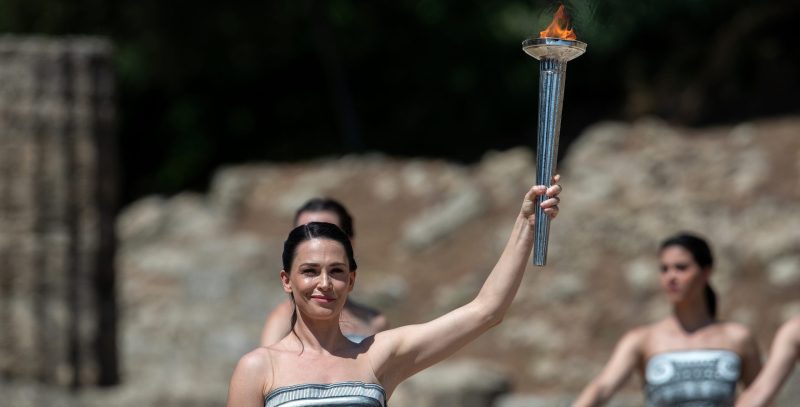
From the 8th century BC. C, the different cities of ancient Greece held sports competitions to worship and honor the gods of Olympus. Every four years, they organized great festivals that brought together all the warriors and fighters of the Greek polis. There the best were recognized and prizes and honors were awarded to the winners.
During these competitions, “Olympic peace” was decreed (ékecheira) and all the polis had to stop their armies and lower their weapons. For this reason, since ancient times, the Olympic Games symbolized healthy and non-violent competition between different nations or cultural groups.
The Greek Olympic Games were held until, in the year 393 AD. C., the Christian Roman emperor Theodosius I judged them as a pagan tradition and prohibited their continuation.
The tradition of the Olympics was resumed at the end of the 19th century when a French nobleman, Baron de Coubertin, decided to create an Olympic committee to coordinate a new Olympics. Its objective was to recover the message of peaceful competition between the different peoples of humanity. Throughout the 20th and 21st centuries, the Olympic Games incorporated new disciplines and more and more national delegations.
Sports, disciplines and events
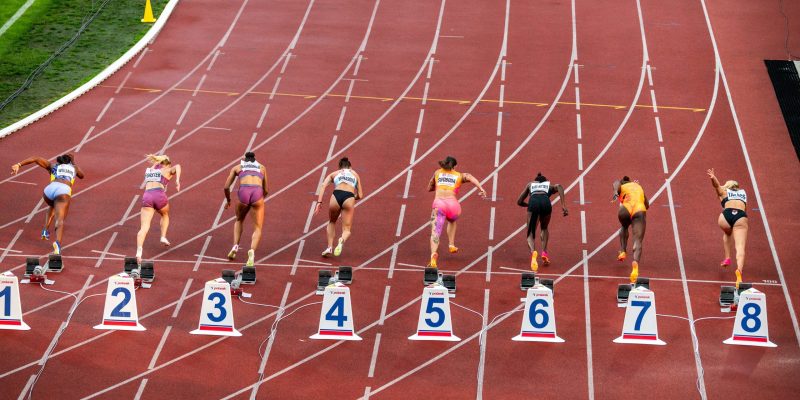
The organization of the Olympic Games competitions is based on the distinction between sports, disciplines and events.
Sport
Sport is a general category that integrates a set of competitive activities. Each sport in the Olympic Games is administered by a specific International Federation (IF) that regulates its rules and competitions. For example, athletics, cycling and gymnastics.
- Sports
Discipline
The discipline is a specific branch or modality within a sport. The same sport can have several disciplines, which in turn can include different types of events. For example, cycling is a sport that includes disciplines such as road cycling, track cycling, BMX and mountain biking.
- Discipline
Event
The event is the specific competition within a discipline, in which you compete for medals. Each event has its own rules and prizes, and competitors or teams are ranked based on their performance in that event. For example, within the discipline of road cycling, there are events such as the individual time trial or the online race.
Traditions and symbols of the Olympic Games
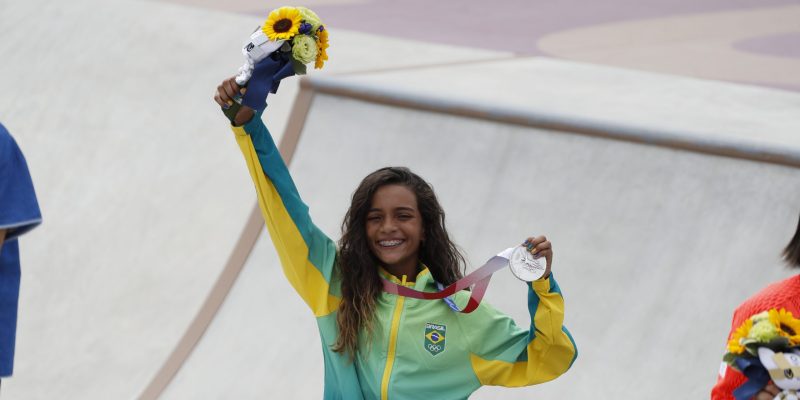
The Olympic Games are characterized by having several traditions that reflect their history and fundamental principles. Furthermore, through different symbols, the values of this competition and the connection between the various participating cultures are highlighted.
Among the main traditions and symbols of the Olympic Games are:
- The Olympic flame. It is a large torch that symbolizes the continuity of the Olympic Games from Antiquity to the present. It is lit in the city of Olympia, Greece, in a special ceremony, and is then transported on a relay to the host city where the Olympic Games are held. This ritual ends with the lighting of the cauldron at the opening ceremony.
- The opening ceremony. It is the event that marks the official start of the games. It includes a parade of delegations from the participating countries, with Greece always parading first, in honor of being the birthplace of the Olympic Games, and the host country bringing up the rear. In addition, cultural shows and the official opening statement by a senior official of the host country are held.
- The Olympic oath. During the opening ceremony, an athlete from the host country takes the Olympic oath on behalf of all competitors. It is about the promise to compete with honor and respect the rules of the game. A similar oath is also taken by a judge and a coach.
- The Olympic flag. It has five interlocking rings of blue, yellow, black, green and red, on a white background. These rings symbolize the union of the five inhabited continents of the world. It represents friendship and global cooperation.
- Medals and podiums. Each competition awards gold, silver and bronze medals to the first three places. Athletes who win a medal go to the podium, where their countries' flag is raised and the gold winner's national anthem is played.
- The closing ceremony. It is the ceremony that marks the end of the games. In it, the Olympic flag is handed over to the mayor of the next host city and the cauldron is extinguished. Cultural shows are also held.
- The Olympic flag relay. During the closing ceremony, the Olympic flag is transferred from the current host city to the next, symbolizing the continuity of the games.
- The Olympic motto. The motto of the Olympic Games is Citius, Altius, Fortiuswhich means “faster, higher, stronger” in Latin. This motto is used in ceremonies and official materials to remember the spirit of improvement and excellence that the Olympic Games promote.
- The Olympic mascot. It is a figure or character that changes in each edition of the Olympic Games and has characteristics related to the culture of the host country.
- It may help you: History of athletics
Summer Olympics sports
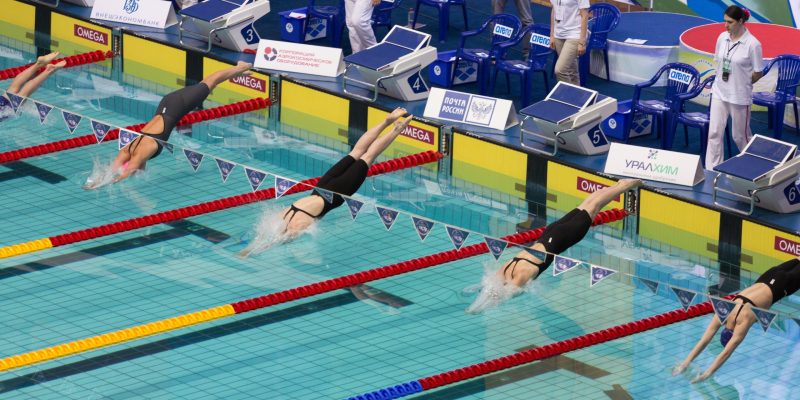
Olympic sports, disciplines and events have been modified throughout the history of the Olympic Games. More and more sports and competition areas have been incorporated.
At the Summer Olympic Games held in Paris 2024, the complete list of competitions included 32 sports and 47 disciplines each of them composed of different events.
| Sports | Disciplines | Main events |
|---|---|---|
| Athletics | Athletics | Running (various distances), walking, jumping, throwing, decathlon, heptathlon, relays, among others. |
| Badminton | Badminton | Men's singles, women's singles, men's doubles, women's doubles, mixed doubles. |
| Basketball | Basketball, 3×3 basketball. | Men's 5×5 basketball, women's 5×5 basketball, men's 3×3 basketball, women's 3×3 basketball. |
| Handball | Handball | Men's tournament, women's tournament. |
| Boxing | Boxing | Different weight categories for men and women. |
| breaking | breaking | Breaking 1vs1 male, breaking 1vs1 female. |
| Cycling | BMX Freestyle, BMX Racing, road cycling, track cycling. | BMX freestyle park, BMX racing, road cycling (online races and time trials), track cycling (speed, pursuit, keirin, among others). |
| Water sports | Swimming, aquatic marathon, diving, water polo, artistic swimming. | Swimming (various distances and styles), aquatic marathon (10 km), diving (platforms and trampoline), water polo (men's and women's teams), artistic swimming (individual and team routines). |
| sport climbing | sport climbing | Combined bouldering and lead (male and female), speed (male and female). |
| Fencing | Fencing | Men's and women's singles, men's and women's teams. |
| Soccer | Soccer | Men's tournament, women's tournament. |
| Gym | Artistic gymnastics, rhythmic gymnastics, trampoline gymnastics. | Artistic gymnastics (teams, individual, apparatus), rhythmic gymnastics (individual and groups), trampoline (male and female). |
| Golf | Golf | Men's singles, women's singles. |
| Weightlifting | Weightlifting | Different weight categories for men and women. |
| Equestrian | Equestrian events, dressage, jumping. | Eventing, dressage, jumping. |
| field hockey | field hockey | Men's tournament, women's tournament. |
| Judo | Judo | Different weight categories for men and women. |
| Struggle | Greco-Roman wrestling, wrestling. | Different weight categories for men and women. |
| Skating | Skateboarding | Street masculine, street feminine, park masculine, park feminine. |
| modern pentathlon | modern pentathlon | Men's competition, women's competition. |
| Canoeing | Sprint canoeing, slalom canoeing. | Different distances and categories for men and women. |
| Rowing | Rowing | Different classes of boats for men and women. |
| Rugby | Rugby 7 | Men's tournament, women's tournament. |
| Surfing | Surfing | Men's competition, women's competition. |
| taekwondo | taekwondo | Different weight categories for men and women. |
| Tennis | Tennis | Men's singles, women's singles, men's doubles, women's doubles, mixed doubles. |
| Table tennis | Table tennis | Men's singles, women's singles, mixed doubles, men's teams, women's teams. |
| Shot | Shot | Rifle, pistol, shotgun (male, female, mixed). |
| archery | archery | Men's singles, women's singles, mixed teams. |
| Triathlon | Triathlon | Men's individual, women's individual, mixed relay. |
| Candle | Candle | Different classes of boats for men, women and mixed. |
| Volleyball | Volleyball, beach volleyball. | Men's volleyball, women's volleyball, men's beach volleyball, women's beach volleyball. |
- See also: Individual sports
Winter Olympics sports
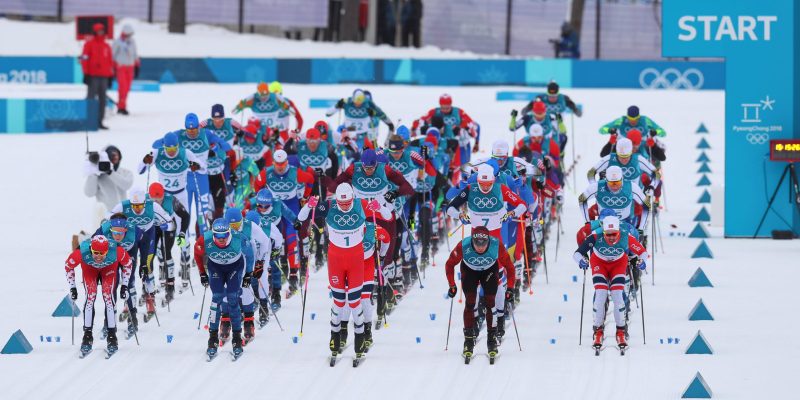
The Winter Olympic Games include 8 sports and 15 disciplines. The Milan Cortina 2026 Winter Olympics will include ski mountaineering as an additional sport for that specific edition.
| Sports | Disciplines | Main events |
|---|---|---|
| Biathlon | Biathlon | Sprint, individual, relay, pursuit. |
| Bobsleigh | Skeleton, bobsleigh. | Double, quadruple (men's and women's competitions). |
| Curling | Curling | Individual, duos, relays. |
| Ice hockey | Ice hockey | Men's and women's tournament. |
| luge | luge | Single, double, relay. |
| Skating | Figure skating, speed skating, short track speed skating. | Men's and women's competitions. |
| mountain skiing | mountain skiing | Individual race, sprint, relay. |
| Alpine skiing | Alpine skiing, cross-country skiing, ski jumping, Nordic combined, acrobatic skiing, snowboarding. | Downhill, super-G, giant slalom, alpine combined, sprint, individual (different distances), relays, teams, normal hill, large hill, aerials, moguls, cross, halfpipe, halfpipe, slopestyle, cross, big air. |
- It may help you: Team sports
International Olympic Committee
The International Olympic Committee (IOC) is the organization that supervises and coordinates the Olympic Games. It was founded in 1894 by Pierre de Coubertin and is headquartered in Lausanne, Switzerland. Its mission is to ensure Olympic values and manage the organization of the games.
The IOC It is made up of members representing different countries and regions. It is responsible for making key decisions about the Olympic Games: selecting host cities, establishing rules and policies, and overseeing financing and promotion of the event.
Importance of the Olympic Games
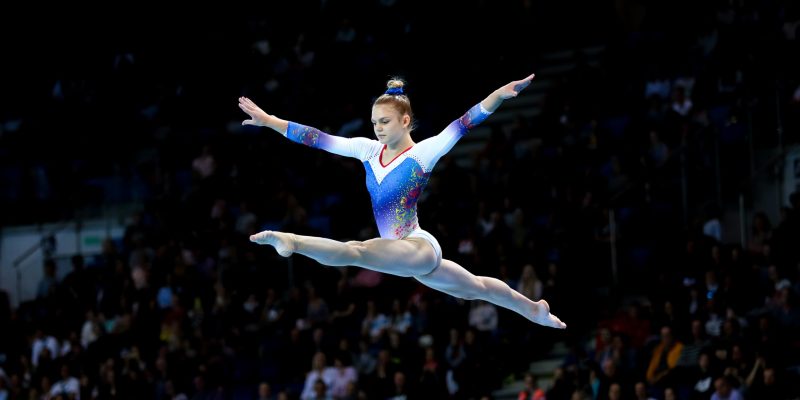
The Olympic Games constitute one of the most important sports competitions in the world both for athletes and competitors as well as for the general public and the countries that are bidding to host.
For many athletes, the Olympic Games represent the peak of their sporting careers. Getting to compete on this world stage involves years of work and dedication. Winning an Olympic medal is one of the greatest achievements you can achieve. In addition, participating in the games offers them additional opportunities, such as sponsorship contracts and greater media visibility.
Athletes have invaluable experience facing the best competitors in the world, allowing them to improve their skills and performance. In that context, representing their country in a competition of this magnitude gives them pride and purpose, and allows them to be recognized by their compatriots.
For the general public, the Olympic Games foster global unity by bringing together people from different cultures and countries and the global coverage of the event creates a sense of community. In addition, games offer entertainment and excitement, with sporting competitions that capture the public's attention and celebrate talent.
For the host country, the Olympic Games represent a significant economic opportunity by attracting tourism and generating income from sales and related events. In addition, they promote the development of infrastructure, new facilities and the modernization of their services.
References
- Abrahams, H.M., and Young, D. (2024). Olympic Games. Encyclopedia Britannica. https://www.britannica.com
- Ackermann, M. (2008). Olympic Games. Encyclopedia of World History, vol. V: Crisis and Achievement. 1900 to 1950. Facts on File.
- Young, D. (2004). A Brief History of the Olympic Games. Blackwell Publishing.





